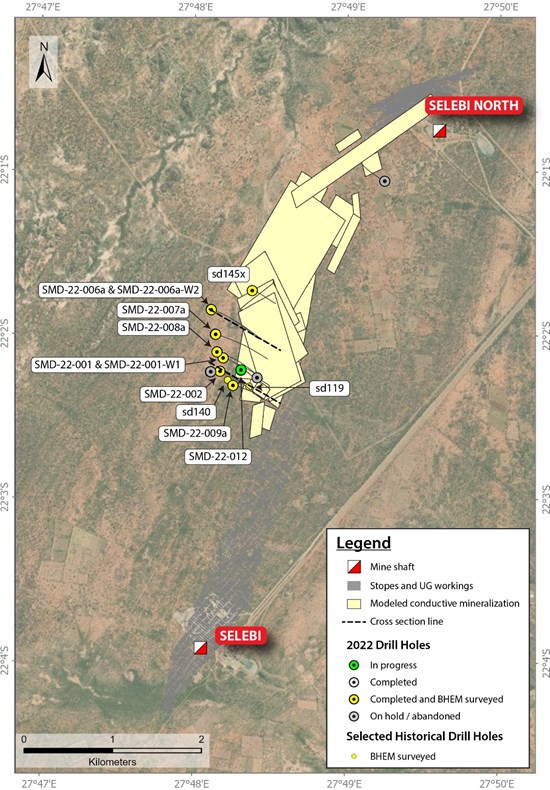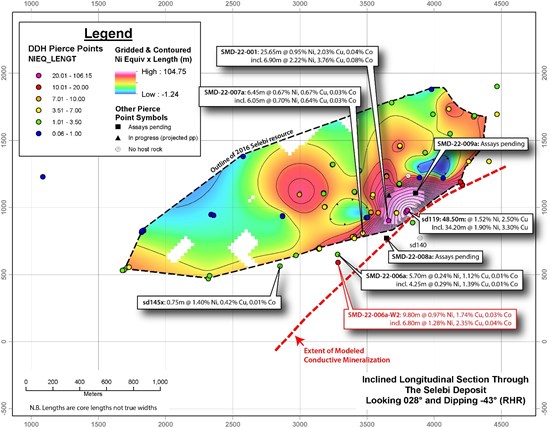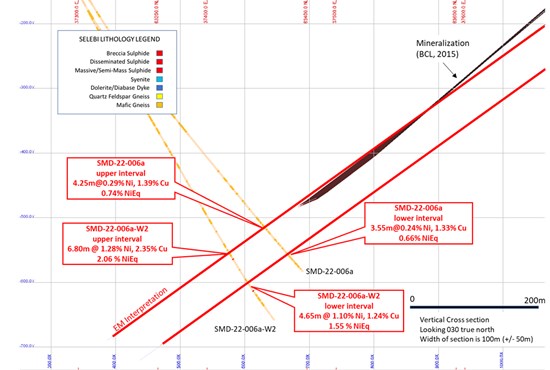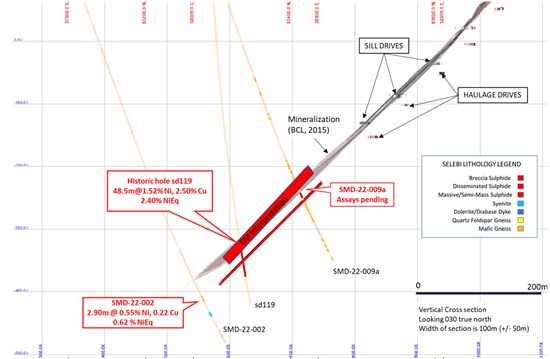Toronto, Ontario--(Newsfile Corp. - December 22, 2022) - Premium Nickel Resources Ltd. (TSXV: PNRL) ("PNRL" or the "Company") is pleased to report additional assay results from the Company's 2022 diamond drilling program at its 100% owned Selebi nickel-copper-cobalt ("Ni-Cu-Co") sulphide mine in Botswana.
The Company previously released results from the first three holes SMD-22-001, SMD-22-002 and SMD 22-001-W1 (see news releases dated August 17 and September 13, 2022). Results have been received for an additional four drillholes, SMD-22-006a, SMD-22-006a-W2, SMD-22-007a and the extension of historic hole sd145x, and are reported herein (see Figure 1). Approximately 14,815 metres of diamond drilling has been completed to date at the Selebi Mine by PNRL in 2022.
Notable highlights include:
- SMD-22-006a-W2 (upper interval): 9.80 metres of 1.56% NiEq (0.97% Ni, 1.74% Cu, 0.03% Co)
including 6.80 metres of 2.06% NiEq (1.28% Ni, 2.35% Cu, 0.04% Co)
- SMD-22-006a-W2 (lower interval): 4.65 metres of 1.55% NiEq (1.10% Ni, 1.24% Cu, 0.04% Co)
The Company's Phase 1 drilling program commenced on March 14, 2022, with the purpose of locating the Selebi Mine mineralized structures within the 3 km area located between the Selebi Mine historical mine workings to the south and the Selebi North Mine historic workings to the north (see Figure 1).
This current phase of drilling is focused on an area at the western down dip edge of the historic 2016 South African Mineral Resource Committee ("SAMREC") compliant Selebi resource (Measured Mineral Resources of 0.37 Mt of 1.01% Ni and 2.19% Cu, Indicated Mineral Resources of 6.82 Mt of 1.05 % Ni and 2.29 % Cu, and Inferred Mineral Resources of 4.09 Mt of 0.86% Ni, which has not been prepared in accordance with NI 43-101, see "Historical Estimate"), as outlined in black on Figure 2, where the Company has shown that the mineralization has greater thicknesses and depth extent than those of the historic resource. Drilling included testing of an off-hole borehole electromagnetic ("BHEM") anomaly identified by PNRL in historic hole sd140, a 2010 drill hole located to the north and down plunge of the historic drill hole sd119 that reported an estimated true thickness interval of 38.5 metres averaging 1.58% Ni and 2.44% Cu, including 21.4 metres of 2.34% Ni and 3.39% Cu. Historic drill hole sd119 is located approximately 300 metres north from the closest Selebi mine underground infrastructure, and is used as PNRL’s point of reference for this initial drill program to help communicate step out distances and geometries of additional drill hole pierce points. (See "Historic Data").
The Company's drilling to date has provided evidence of at least two mineralized amphibolite hosted horizons that are separated by gneiss. All four of these drillholes intersected the same two intervals of amphibolite hosted Ni-Cu-Co mineralization, including SMD-22-006a-W2 that is located approximately 500 metres down-plunge of previously announced SMD-22-001 and 650 metres from historic hole sd119. By drilling down-dip to the west, the Company has intercepted thicker intervals of mineralization when compared to the widths reported in the historic Selebi SAMREC resource (see "Historical Estimate"). Although the lower mineralized amphibolite has been intersected in historic drill holes, drill hole SMD-22-006a-W2 is the first occurrence of significant widths and grades in the lower interval.
Keith Morrison, CEO commented: “PNRL’s work on the Selebi Mine continues to demonstrate significant expansion potential and mineralization continuity along strike, down dip and down plunge of the historic 2016 SAMREC compliant resources (which included Measured Mineral Resources of 0.37 Mt of 1.01% Ni and 2.19% Cu, Indicated Mineral Resources of 6.82 Mt of 1.05 % Ni and 2.29 % Cu, and Inferred Mineral Resources of 4.09 Mt of 0.86% Ni and 1.21 % Cu at Selebi as well as included Measured Mineral Resources of 0.71 Mt of 1.24% Ni and 1.03% Cu, Indicated Mineral Resources of 1.14 Mt of 1.27 % Ni and 1.13 % Cu, and Inferred Mineral Resources of 2.79 Mt of 0.93 % Ni and 0.87 % Cu at Selebi North) (see "Historical Estimate"). The strategic initiative through this first phase of drilling is to obtain the necessary geoscience data to advance to the second phase of drilling, which is the transition to underground resource drilling at both the Selebi and Selebi North deposits. Our team is using an integrated data driven process incorporating BHEM, televiewer surveys, structural modeling and surface drilling to extend the known mineralization from the south (Selebi) and from the north (Selebi North), as the Company believes Selebi Mine could be a single continuous mineralized system. The borehole geophysics has been very successful in imaging highly conductive metallic mineralization along the down-dip structure possibly joining the two deposits over a length greater than 3,000 metres. The structural understanding increases as more holes are drilled, additional geophysical surveys are completed, and multiple mineralized structures at the Selebi North deposit are identified and explored. Data supported modelling is beginning to demonstrate that the mineralized Selebi North structures could be potentially related to similar structures below the Selebi deposit and mine horizon.”
Project Update:
When the Company took possession of the Selebi Mine in January, up-side potential was defined by an off-hole anomaly associated with a significant intersection in historic drillhole sd119 and a vision that the Selebi and Selebi North Mines connected at depth. Through the execution of a state-of-the-art technical program, the Company has increased the upside potential with 1) the identification of a structural corridor where intervals of mineralization are thicker and 2) has a strong indication through geophysics that the Selebi and Selebi North deposits are connected at depth. Conductivity defined to date through BHEM surveys correlates well with known nickel-copper mineralization intersected in drill holes. It is fortunate that there are no other known sources of conductivity along the mine horizon to complicate the interpretation of the mineralized amphibolite.
These four recent drill holes were designed to test the BHEM conductivity along the interpreted down dip structures, following the anticipated plunge of these structures from sd119 to the north. Drill holes SMD-22-006a and SMD-22-007a lifted during drilling and as a result are approximately 100 metres up-dip of the target location and main thickening structure. SMD-22-006a-W2 was drilled to straighten out and pierce closer to the original target location. Historic drill hole sd145x was extended to provide structural information in an area of sparse drilling and is also up-dip of the target area (see Figure 3).
The drilling to date has not fully defined the plunge direction or dip extent of the structurally controlled thickening. BHEM and drill data indicates that the plunge direction is turning towards the west with depth and indicates a down-dip extension of the mineralization in both the upper and lower intervals in SMD-22-006a-W2. The BHEM data from all holes is currently being integrated with the updated structural model to refine the location of the controlling structures for more precise resource drilling in 2023. In an effort to accelerate the release of assays, we are working diligently to improve the drill hole rate of advancement and timely receipt of lab results. We are also increasing the number of drill rigs for the second phase of drilling.
Drilling is on-going and two additional holes have been completed with assays pending. This includes drill hole SMD-22-008a, targeting the mineralized amphibolite 130 metres downdip from SMD-22-001, SMD-22-009a targeting a gap in historic drilling east and south of sd119 drill hole, and SMD-22-012 targeting a gap northeast of sd119 and is in progress. By reducing the distance between historic holes, the company is moving toward a better understanding of the structural controls on mineralization and also working toward defining a potential inferred resource that may be used in a future PEA.
A summary of assays and drill collar information are provided in Tables 1 and 2, respectively. Drill hole locations and drilling results are provided as Figure 1, Figure 2, Figure 3, Figure 4 and Figure 5, respectively. Figures may be viewed using the link provided with this news release.
Table 1: Assay Results Selebi Mine
| Hole-ID | From (m) | To (m) | Length (m) | Ni (%) | Cu (%) | Co (%) | S (%) | NiEq (%) |
| SMD-22-006a | 1575.20 | 1580.90 | 5.70 | 0.24 | 1.12 | 0.01 | 3.35 | 0.60 |
| Including | 1575.20 | 1579.45 | 4.25 | 0.29 | 1.39 | 0.01 | 4.23 | 0.74 |
| 1627.00 | 1634.55 | 7.55 | 0.25 | 0.94 | 0.01 | 2.95 | 0.55 | |
| Including | 1631.00 | 1634.55 | 3.55 | 0.24 | 1.33 | 0.01 | 3.27 | 0.66 |
| SMD-22-006a-W2 | 1581.50 | 1591.30 | 9.80 | 0.97 | 1.74 | 0.03 | 13.32 | 1.56 |
| Including | 1581.50 | 1588.30 | 6.80 | 1.28 | 2.35 | 0.04 | 17.71 | 2.06 |
| 1627.00 | 1631.00 | 4.00 | 0.66 | 0.40 | 0.03 | 6.57 | 0.83 | |
| 1639.80 | 1644.45 | 4.65 | 1.10 | 1.24 | 0.04 | 12.01 | 1.55 | |
| SMD-22-007a | 1451.40 | 1457.85 | 6.45 | 0.66 | 0.67 | 0.03 | 8.54 | 0.91 |
| Including | 1451.40 | 1457.45 | 6.05 | 0.70 | 0.64 | 0.03 | 8.96 | 0.95 |
| 1460.5 | 1462.2 | 1.70 | 0.75 | 0.71 | 0.02 | 9.31 | 1.01 | |
| 1467.40 | 1469.30 | 1.90 | 0.32 | 1.79 | 0.01 | 5.48 | 0.88 | |
| 1509.95 | 1510.70 | 0.75 | 1.82 | 1.07 | 0.08 | 17.19 | 2.29 | |
| sd145x | 1519.30 | 1520.05 | 0.75 | 1.40 | 0.42 | 0.01 | 15.65 | 1.55 |
| 1573.00 | 1580.75 | 7.75 | 0.21 | 1.09 | 0.00 | 2.73 | 0.54 |
Length refers to drillhole length and not true width. True width is interpreted to be approximately 85% of drill hole length.
NiEq% = Ni% + Cu% x $3.78/$12.46 + Co% x $23.12/$12.46. Prices based in $US obtained by LME Dec 19th, 2022.
No adjustments were made for recovery or payability.
Table 2: Drill Collar Information Selebi Mine
| HOLE ID | UTM EAST | UTM NORTH | elevation | hole length | comment |
| SMD-22-006a | 582755.4 | 7563540.9 | 903.25 | 1657.75 | Re-start of SMD-22-006, hole completed |
| SMD-22-006a-W2 | 582755.4 | 7563540.9 | 903.25 | 1696.3 | wedged from SMD-22-006a at 840.45 |
| SMD-22-007a | 582804.5 | 7563264.1 | 903.5 | 1592.77 | re-start of SMD-22-007 - hole completed |
| sd145x | 583217.7 | 7563755.6 | 898.6 | 1660.86 | Extension of sd145 from 1150.21m |
Further details of drilling completed at the Selebi deposit are outlined below.
SMD-22-006a intersected mineralization 455 metres down plunge of SMD-22-001. The upper and lower intervals of amphibolite with localized Ni-Cu sulphide mineralization were encountered; the two intervals are separated by a 30.65 metre interval of quartzo feldpathic gneiss with local quartz flooding and decimetre sized felsic pegmatitic units.
The sulphide mineralization in the upper amphibolite interval consists of textures ranging from disseminated, to coarse blebby and local semi-massive, to massive sulphide stringers hosted in a coarse-grained massive amphibolite which returned 4.25 metres of 0.29% Ni,1.39% Cu and 0.01% Co from 1575.20 to 1579.45 metres.
The lower mineralized biotite altered amphibolite interval contains primarily disseminations and blebby sulphides with localized intervals of chalcopyrite-rich stringers to semi-massive sulphides which returned 3.55 metres of 0.24% Ni, 1.33% Cu and 0.01% Co from 1631.00 to 1634.55 metres.
SMD-22-006a-W2, wedged from SMD-22-006a, intersected the target mineralized horizon 70 metres downdip of SMD-22-006a. The sulphide mineralization in the upper amphibolite interval occurs from 1581.50 to 1591.30 metres with textures ranging from disseminated, to coarse blebby and local decimeter to metre length semi-massive to massive sulphides which returned 9.80 metres of 0.97% Ni, 1.74% Cu and 0.03% Co. A higher grade 6.80 metre interval starting at 1581.50 metres returned 1.28% Ni, 2.35% Cu and 0.04% Co.
The lower mineralized biotite schistose amphibolite interval occurs from 1625 to 1651 metres and contains primarily disseminations and blebby sulphides with localized intervals of semi-massive sulphides amidst sporadic quartz flooding and strong biotite alteration.
Two intervals of significant sulphide mineralization were intercepted. An initial 4.00 metre intercept beginning from 1627.00 metres returned 0.66% Ni, 0.40% Cu and 0.03% Co. A lower 4.65 metre intercept from 1639.80 to 1644.45 metres returned 1.10% Ni, 1.24% Cu and 0.04% Co. BHEM indicates conductivity of the upper and lower intervals continues to 125 metres downdip and remain parallel to each other.
The drill results from SMD-22-006a and SMD-22-006a-W2 are shown on a vertical section in Figure 4. For comparison, the parallel section that includes sd119 (520m south) is shown on Figure 5. The two sections are shown on the plan map in Figure 1.
Similar to drill hole SMD-22-006a-W2, SMD-22-007a intersected three separate intervals of copper and nickel sulphide mineralization 240 metres down plunge of SMD-22-001. The sulphide mineralization along the upper contact between the felsic gneiss and amphibolite returned a 6.45 metre intercept of 0.66% Ni, 0.67% Cu and 0.03% Co from 1451.40 to 1457.85 metres. This mineralization ranged from disseminated, to coarse blebby and local semi-massive to massive sulphide veins.
An additional 1.70 metre intercept at 1460.50 to 1462.50 metres reported a mineralized contact of 0.75% Ni, 0.71% Cu and 0.02% Co, continuing with 1.90 metres reported at 1467.40 to 1469.30 metres in a lower mineralized contact reporting value of 0.32% Ni, 1.79% Cu and 0.01% Co. The lower mineralized amphibolite interval contains primarily semi-massive sulphides which returned 0.75 metres of 1.82% Ni, 1.07% Cu and 0.08% Co from 1509.95 to 1510.70 metres.
The most distant Selebi step-out was drilled by deepening of 2010 historic drill hole sd145x. This drill hole is located approximately 1,050 metres north of historic drill hole sd119 (see Figure 3) and 880 metres north of SMD-22-001. This drill hole was extended by 510 metres to infill a gap between historic drilling (600 metres between intercepts), in addition to providing a BHEM platform. It is located 325 metres up-dip of the interpreted target area of increased thickness of mineralization.
Drill hole sd145x intercepted two intervals of mineralized amphibolite separated by a 53 metre interval of gneiss. A narrow sulphidic amphibolitic unit was intersected at the expected depth of the upper zone. The zone consisted primarily of semi-massive veins and stringers which returned 0.75 metres of 1.40% Ni, 0.42% Cu and 0.01% Co from an interval beginning at 1519.30 metres.
The lower interval consisted of a much broader span of mineralization over a sporadically flooded quartz, biotite altered, schistose amphibolite occurrence from 1570.85 to 1580.75 metres. An interval of coarse sulphide blebs, disseminations and semi massive veins returned 7.75 metres of 0.21% Ni, 1.09% Cu and 0.004% Co from 1573.00 to 1580.75 metres.
The remaining assay results, combined with the ongoing BHEM, gyro programs and structural data will help the team define and support the upcoming underground drilling programs at Selebi.
Quality Control
The drilling was completed by Mitchell Drilling of Botswana utilizing a Sandvik UDR1500 diamond drill rig. Drill core samples (47.75 mm NQ) and Discovery Drilling using a DS2500 diamond drill coring BQ sized drill core (36.5mm). All samples are ½ core cut by a diamond saw on site. Half of the core is retained for reference purposes. Samples are generally 1.0 to 1.5 metre intervals or less at the discretion of the site geologists. Sample preparation and lab analysis was completed at the ALS Chemex in Johannesburg, South Africa. Commercially prepared blank samples and certified Cu/Ni sulphide analytical control standards with a range of grades are inserted in every batch of 20 samples or a minimum of one set per sample batch. Analyses for Ni, Cu and Co are completed using a peroxide fusion preparation and ICP-AES finish (ME-ICP81).
Holes are numbered as follows: SMD (Selebi Main Diamond) + year + hole number starting at 1. The addition of W indicates a wedge was used to deflect the hole, either back toward its intended target, or to splay a daughter hole from the parent hole. The addition of an 'x' indicates that a hole was extended.
Qualified Person
The scientific and technical content of this news release has been reviewed and approved by Sharon Taylor, Chief Geophysicist of the Company, who is a "qualified person" for the purposes of National Instrument 43-101 - Standards of Disclosure for Mineral Projects ("NI 43-101").
Technical Report
Scientific and technical information relating to the Selebi Mine is supported by the technical report titled "Technical Report on the Selebi Mines, Central District, Republic of Botswana, Report for NI 43-101", dated June 16, 2022 (effective date of March 1, 2022) (the "Selebi Technical Report"), and prepared by SLR Consulting (Canada) Ltd. for PNRL. Reference should be made to the full text of the Selebi Technical Report, including to review the assumptions, limitations and data verification relating to the historic data compilation presented in this news release, which was prepared in accordance with NI 43-101 and is available electronically on SEDAR (www.sedar.com) under PNRL's issuer profile.
Historic Data
The work undertaken by the Company and SLR Consulting (Canada) Ltd. to verify the historic data compilation is further described in the Selebi Technical Report. While (i) visual estimates of oxidized sulphides appear to correlate well with logged intercepts and analytical values, and (ii) analytical values compared between the logs and the digital database appear to compare well, the technical team continues to collect, compile, review and validate historic technical data relevant to the project. To that end, the Selebi Technical Report recommends continued compilation and verification to confirm that the QA/QC program results are adequate to support the inclusion of the historical drill hole information in a mineral resource estimate in accordance with NI 43-101.
Historical down-dip drill hole sd140 was re-opened between October 19, 2021 and November 14, 2022 to facilitate new gyro and BHEM surveys. The hole failed to intersect mineralization and also failed to intersect the host amphibolite at the anomaly depth.
Historical Estimate
The historical SAMREC compliant resource (the "Historic SAMREC Resource") that was calculated for the Selebi Mine in 2016 is considered to be historical in nature has not been prepared in accordance with NI 43-101 and should not be relied upon as a current mineral resource estimate. While management believes that the Historic SAMREC Resource could be indicative of the presence of mineralization on the Selebi deposit, a qualified person has not completed sufficient work to classify the historical mineral estimate as a current mineral resource estimate and PNRL is not treating the historical mineral estimates as current mineral resource estimate.
About Premium Nickel Resources Ltd.
PNRL is a Canadian company dedicated to the exploration and development of high-quality nickel copper + cobalt resources. PNRL believes that the medium to long-term demand for these metals will continue to grow through global urbanization and the increasing replacement of internal combustion engines with electric motors. Importantly, these metals are key to a low-carbon future.
PNRL focuses its efforts on discovering world class nickel sulphide assets in jurisdictions with rule of-law that comply with PNRL's values and principles which surpasses the highest industry standards. PNRL is committed to governance through transparent accountability and open communication within our team and our stakeholders.
PNRL maintains a skilled team that has worked on over 100 projects collectively, accumulating over 400 years of resource discoveries, mine development and mine re-engineering experience on projects like Selebi and Selkirk. PNRL's team members have on average more than 20 years of experience in every single aspect of mine discovery and development, from geology to operations.
On January 31, 2022, PNRL closed the acquisition of PNRL's flagship asset, the Selebi Mine. The Selebi Mine includes two shafts (Selebi and Selebi North shafts) and related infrastructure (rail, power and water). Shaft sinking and plant construction started in 1970. Mining concluded in October 2016 when the operations were placed on care and maintenance due to a failure in the separate and offsite processing facility. The Selebi Mine was subsequently placed under liquidation in 2017. The proposed work plan for the Selebi Mine includes diamond drilling which is expected to be ongoing for up to 18 months. During that time, additional metallurgical samples will be collected and sent for more detailed studies. The underground infrastructure at Selebi North will be upgraded to support an underground drilling program as well as improved health & safety.
In addition, PNRL is evaluating direct and indirect nickel asset acquisition opportunities globally, and also: (i) holds 100% interest in the Selkirk Mine which was acquired in August 2022 as well as four adjacent Prospecting Licenses in Botswana, (ii) holds a 100% interest in the Maniitsoq property in Greenland, which is a camp-scale permitted exploration project comprising 3,048 square kilometres covering numerous high-grade nickel-copper + cobalt-sulphide occurrences associated with norite and other mafic-ultramafic intrusions of the Greenland Norite Belt; (iii) holds a 100% interest in the Post Creek/Halcyon property in Sudbury, Ontario which is strategically located adjacent to the past producing Podolsky copper-nickel-precious metal sulphide deposit of KGHM International Ltd.; (iv) holds a 100% ownership of property in the Quetico region near Thunder Bay, Ontario; and (v) is expanding its area of exploration interests into Morocco.
ON BEHALF OF THE BOARD OF DIRECTORS
Keith Morrison
Chief Executive Officer
Premium Nickel Resources Ltd.
For further information about Premium Nickel Resources Ltd., please contact:
Jaclyn Ruptash
Vice President Business Development
+1 (604) 770-4334
Cautionary Note Regarding Forward-Looking Information
Certain statements contained in this news release may be considered "forward‐looking statements" within the meaning of applicable Canadian securities laws, including anticipated assay results; the ability of exploration results (including drilling) to accurately predict mineralization; the significance of exploration (including drilling) results; the objectives of the first phase; the ability of the Company to transition to underground resource drilling at Selebi North and Selebi; the ability of assay results to indicate mine horizons and mineralization, at all, including beyond the limits of legacy production; management's interpretation of BHEM data; the ability of the Company to use exploration drifts; the ability of the Company to verify historic data; the potential for establishing a mineral resource estimate on the Selebi deposit at depth; the Company's ability to re-characterize the historic work on the Selebi Mine; the potential for continuity and significant mineralization expansion of the Selebi Mine; the potential of the Selebi and Selkirk mines, in general, including related infrastructure; the veracity of previously unsampled core; the Company's ability to identify additional mineral resources; and the business and prospects of the Company. These forward‐looking statements, by their nature, require the Company to make certain assumptions and necessarily involve known and unknown risks and uncertainties that could cause actual results to differ materially from those expressed or implied in these forward‐looking statements. Forward‐looking statements are not guarantees of performance. Words such as "may", "will", "would", "could", "expect", "believe", "plan", "anticipate", "intend", "estimate", "continue", or the negative or comparable terminology, as well as terms usually used in the future and the conditional, are intended to identify forward‐looking statements. Information contained in forward‐looking statements, including the anticipated work programs, assay results, historical data, management's interpretation and understanding of geology, management's understanding of the acquired properties and infrastructure, are based upon certain material assumptions that were applied in drawing a conclusion or making a forecast or projection, including management's perceptions of historical trends, current conditions and expected future developments, current information available to the management of the Company, public disclosure from operators of the relevant mines, as well as other considerations that are believed to be appropriate in the circumstances. The Company considers its assumptions to be reasonable based on information currently available but cautions the reader that their assumptions regarding future events, many of which are beyond the control of the Company, may ultimately prove to be incorrect since they are subject to risks and uncertainties that affect the Company and its businesses.
For additional information with respect to these and other factors and assumptions underlying the forward‐looking statements made in this news release concerning the Company, see (i) the section entitled "Risks and Uncertainties" in the most recent management discussion and analysis of the Company, and (ii) the risk factors outlined in the filing statement of the Company dated July 22, 2022, both of which are available electronically on SEDAR (www.sedar.com) under Premium Nickel Resource Ltd's issuer profile. The forward‐looking statements set forth herein concerning the Company reflect management's expectations as at the date of this news release and are subject to change after such date. The Company disclaims any intention or obligation to update or revise any forward‐looking statements, whether as a result of new information, future events or otherwise, other than as required by law.
Neither the TSX Venture Exchange nor its Regulation Services Provider (as that term is defined in the policies of the TSX Venture Exchange) accepts responsibility for the adequacy or accuracy of this news release. No stock exchange, securities commission or other regulatory authority has approved or disapproved the information contained herein.
Figure 1. Drill hole location map
To view an enhanced version of this graphic, please visit:
https://images.newsfilecorp.com/files/7759/149237_4c48989b14714ba7_002full.jpg
Figure 2. Selebi and Selebi North Long Section: Drilling and Modeled BHEM Conductors
To view an enhanced version of this graphic, please visit:
https://images.newsfilecorp.com/files/7759/149237_4c48989b14714ba7_003full.jpg
Figure 3. Selebi Drill Results: Inclined Long Section Through the Selebi Deposit
To view an enhanced version of this graphic, please visit:
https://images.newsfilecorp.com/files/7759/149237_4c48989b14714ba7_004full.jpg
Figure 4. Selebi Drill Results: Vertical Cross Section through SDM-22-006a and SMD-22-006a-W2 at the Selebi Deposit
To view an enhanced version of this graphic, please visit:
https://images.newsfilecorp.com/files/7759/149237_4c48989b14714ba7_005full.jpg
Figure 5. Selebi Drill Results: Vertical Cross Section through sd119 and SMD-22-002 at the Selebi Deposit
To view an enhanced version of this graphic, please visit:
https://images.newsfilecorp.com/files/7759/149237_4c48989b14714ba7_006full.jpg

To view the source version of this press release, please visit https://www.newsfilecorp.com/release/149237







